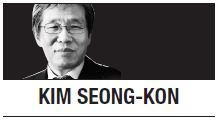[Kim Seong-kon] Vanishing Korean Diaspora and their writings
By Kim Seong-konPublished : Sept. 19, 2017 - 17:35
 Last week, I attended the third International Congress of Writers Writing in Korea held at Gyeongju under the auspices of the international P.E.N. Korea Centre. The conference, which brought together 50 writers from all over the world, including both Korean-heritage and non-heritage writers, turned out to be a huge success.
Last week, I attended the third International Congress of Writers Writing in Korea held at Gyeongju under the auspices of the international P.E.N. Korea Centre. The conference, which brought together 50 writers from all over the world, including both Korean-heritage and non-heritage writers, turned out to be a huge success. At the meeting I met professor Kim Jong-hoe who is an expert on Korean Diaspora. Professor Kim has been traveling to many countries on behalf of Kyung Hee University to award the KU literary prize to outstanding overseas writers who write in Korean.
He told me that those writing in Korean in foreign countries, who are quite old now, will disappear in the near future as the first-generation immigrants will die out. It made me sad to realize that all those invaluable diasporic experiences written by them in Korean will be buried in oblivion. Undoubtedly, the second and third generation immigrants will no longer be interested in their parents’ diasporic writings written in Korean.
Today, more than 7 million Koreans are residing outside of Korea as immigrants. Scattered all over the world, they disseminate Korean culture on the one hand and assimilate with foreign culture on the other. In the United States, for example, there are reportedly 1.5 million Korean Americans currently in residence.
These numbers have been increasing dramatically over the past century, since the first Korean immigration to Hawaii in January 1903. The diasporic experiences of those who immigrated to the United States and elsewhere have been faithfully reflected and recorded in numerous works of fiction, poetry and essays written by them.
In the introduction to a book, “Diaspora in Korean (Immigrant) Literature,” professor So-hee Lee and I write in the preface that the term “diaspora” originally refers to the state of exile of dispersed Jewish peoples and the religious and cultural affiliations they uphold despite geographical distances. We also argue that with increased population mobility and widespread information, “diaspora” has acquired a broader meaning lately. Recent literary and cultural studies have determined that the reinterpretation of ethnicity, nationality and globalization has increased the number of social formations that might be labeled as diasporic. Therefore, the term can be nicely applied to Korean immigrants who are closely connected by a network of family ties, morality, manners, and cultural traditions to their homeland.
However, this sense of cultural belonging may produce certain undesirable side-effects, such as “strong nostalgic and separatist tendencies.” This tendency is especially manifest in Korean immigrants who are instinctively inclined to their homeland and thus become nostalgic wherever they go. That is why scholars of diaspora propose that the term “diaspora” be interpreted as something referring to a sense of displacement in a host country rather than to nostalgia for an actual homeland.
More recently, scholars have argued that diaspora can also be used loosely to describe a kind of “dispersed intellectual formation.” In other words, diaspora includes in its definition the spiritual exile of uprooted, displaced writers or intellectuals living in a postcolonial situation who search for a cultural identity while immersed within a hybrid cultural environment where their indigenous cultures are invariably marginalized and suppressed.
When we discussed diaspora in the past, our concern was limited to Korean-American, Korean-Russian or Korean-Japanese writers who write in their host countries’ language. These days, however, our concern has been drastically expanded to the Korean immigrants who write in Korean on foreign soil. It might be a good idea, therefore, to record and preserve their diasporic experiences because they were not only a valuable cultural text but also an important social document.
Some time ago, professor emeritus Young-Key Kim-Renaud at George Washington University sent me a copy of the literary magazine published in Korean by the Korean Americans in Washington, DC. Reading it, I was deeply moved by the superb rendition of their diasporic experiences. I also met a number of Korean writers writing in Korean in Los Angeles, who were so enthusiastic about and proud of their literary activities. Their main concern was how to render the compelling issues of immigrants such as how to mediate the irreducible chasm between their indigenous cultural identity and the dominant culture, into which they have to assimilate and acculturate.
There is some encouraging news. Currently, professor Park Duk-kyu is administering a series of summer lectures for the Korean communities in LA on behalf of Dankuk University. The Ministry of Culture, Sports and Tourism, too, has recently launched a project designed to support the immigrant writers who write in Korean overseas. Indeed, it is a high time that we encouraged and supported Korean immigrant writers who write in Korean overseas.
The new literary movement, “transnationalism,” allows immigrants to be loyal not only to their host country but also to their home country. If so, supporting their diasporic writings will surely strengthen the spiritual ties between the Koreans and the Korean immigrants overseas.
By Kim Seong-kon
Kim Seong-kon is a professor emeritus of English at Seoul National University and president of the Literature Translation Institute of Korea. He can be reached at sukim@snu.ac.kr. -- Ed.



















